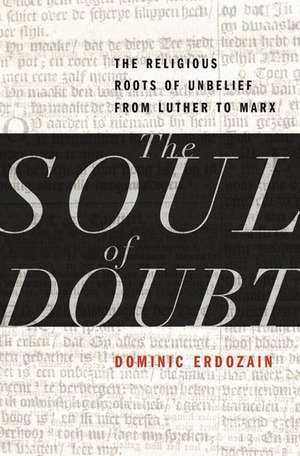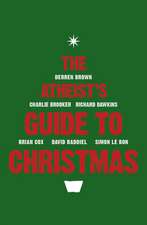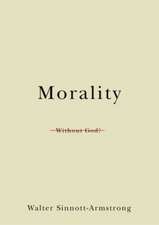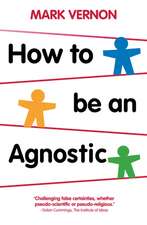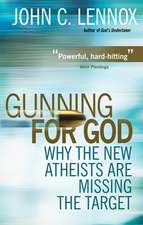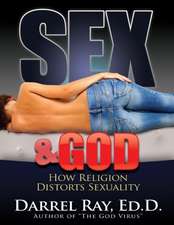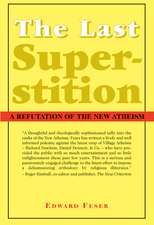The Soul of Doubt: The Religious Roots of Unbelief from Luther to Marx
Autor Dominic Erdozainen Limba Engleză Hardback – 8 oct 2015
Preț: 321.01 lei
Preț vechi: 366.29 lei
-12% Nou
Puncte Express: 482
Preț estimativ în valută:
61.43€ • 63.65$ • 51.27£
61.43€ • 63.65$ • 51.27£
Carte tipărită la comandă
Livrare economică 10-17 martie
Preluare comenzi: 021 569.72.76
Specificații
ISBN-13: 9780199844616
ISBN-10: 0199844615
Pagini: 338
Dimensiuni: 157 x 236 x 25 mm
Greutate: 0.48 kg
Editura: Oxford University Press
Colecția OUP USA
Locul publicării:New York, United States
ISBN-10: 0199844615
Pagini: 338
Dimensiuni: 157 x 236 x 25 mm
Greutate: 0.48 kg
Editura: Oxford University Press
Colecția OUP USA
Locul publicării:New York, United States
Recenzii
a clear and lively counternarrative addressed to those who still believe religion can only restrain rather than liberate and that Christianity necessarily opposes what modernity values. For this audience, including many students as well as committed secularists with their own entrenched interpretations of the canonical figures Erdozain studies, this should be a valuable and important study.
Erdozain's book is a valuable revision of the history of unbelief, an implicit call for Christians to admit that our superiority complexes can fuel doubt, and an invitation for historians to examine not just the minds of their subjects but also their souls. Moreover, Erdozain is a brilliant stylist--each page contains turns of phrase that make this both convincing and enjoyable reading ... [A] must read.
It is rare to find an academic book which is such an active pleasure to read...provocative and thoughtful.
The Soul of Doubt is a lively genealogy of the deconfessionalizing and secularizing of a religious conscience that never fully escapes its origins. Erdozain applies his brilliant prose to a wealth of primary sources to argue that the anti-religious fury of a figure such as Marx is an extension of the critical restoring and reforming impulse that can be traced back (at least) to Luther...In this book, Erdozain has powerfully challenged the assumptions of both schools of thought by revealing the religiously rooted motivations of some of the most notoriously (supposedly) anti-Christian authors and the blurred lines between secular and religious thought between the 16th and 19th centuries. Needless to say, this argument has profound implications for contemporary narratives that either lament or celebrate a purported conflict between faith and reason and steady march of secularization.
It is a great merit of Dominic Erdozain's book that it provides an approachable and well-wrought account of the development of such pluralism over the past 500 years ... Writing with great verve and passion, Erdozain is tireless in assembling texts and citations to support his various interpretations.
This is an elegantly written, well-argued book.
This is the most important book on religious doubt in the modern West since Charles Taylor's A Secular Age.
The Problem of Pleasure established Erdozain as one of the most original and provocative new voices in modern Christian history, and specifically in the history of secularisation. This tour de force of incisive argument and wide-ranging erudition confirms his reputation. Others have suggested that the most powerful critiques of Christian orthodoxy have been primarily moral, indeed religious, but no-one has pursued this argument so consistently and across three centuries.
This wide-ranging book offers a compelling account of the Christian roots of secularism. It skillfully blends intellectual history with the 'raw fuel' of human, historically-located lived experience, a force that Erdozain terms 'conscience.' The text sparkles with thought-provoking analogies and metaphors, and it establishes Erdozain's reputation as one of the most accomplished scholars of religion writing about the post-Reformation world.
Erdozain has made a fascinating contribution to understanding the religious and theological context of the rise of secularism
Erdozain's study thus succeeds not as a nuanced account of theology's unpredictable significance (for that, readers should look to works like Schreiner's) but as a clear and lively counternarrative addressed to those who still believe religion can only restrain rather than liberate and that Christianity necessarily opposes what modernity values. For this audience, including many students as well as committed secularists with their own entrenched interpretations of the canonical figures Erdozain studies, this should be a valuable and important study.
Erdozain's book is a valuable revision of the history of unbelief, an implicit call for Christians to admit that our superiority complexes can fuel doubt, and an invitation for historians to examine not just the minds of their subjects but also their souls. Moreover, Erdozain is a brilliant stylist--each page contains turns of phrase that make this both convincing and enjoyable reading ... [A] must read.
It is rare to find an academic book which is such an active pleasure to read...provocative and thoughtful.
The Soul of Doubt is a lively genealogy of the deconfessionalizing and secularizing of a religious conscience that never fully escapes its origins. Erdozain applies his brilliant prose to a wealth of primary sources to argue that the anti-religious fury of a figure such as Marx is an extension of the critical restoring and reforming impulse that can be traced back (at least) to Luther...In this book, Erdozain has powerfully challenged the assumptions of both schools of thought by revealing the religiously rooted motivations of some of the most notoriously (supposedly) anti-Christian authors and the blurred lines between secular and religious thought between the 16th and 19th centuries. Needless to say, this argument has profound implications for contemporary narratives that either lament or celebrate a purported conflict between faith and reason and steady march of secularization.
It is a great merit of Dominic Erdozain's book that it provides an approachable and well-wrought account of the development of such pluralism over the past 500 years ... Writing with great verve and passion, Erdozain is tireless in assembling texts and citations to support his various interpretations.
This is an elegantly written, well-argued book.
This is the most important book on religious doubt in the modern West since Charles Taylor's A Secular Age.
The Problem of Pleasure established Erdozain as one of the most original and provocative new voices in modern Christian history, and specifically in the history of secularisation. This tour de force of incisive argument and wide-ranging erudition confirms his reputation. Others have suggested that the most powerful critiques of Christian orthodoxy have been primarily moral, indeed religious, but no-one has pursued this argument so consistently and across three centuries.
This wide-ranging book offers a compelling account of the Christian roots of secularism. It skillfully blends intellectual history with the 'raw fuel' of human, historically-located lived experience, a force that Erdozain terms 'conscience.' The text sparkles with thought-provoking analogies and metaphors, and it establishes Erdozain's reputation as one of the most accomplished scholars of religion writing about the post-Reformation world.
Erdozain has made a fascinating contribution to understanding the religious and theological context of the rise of secularism
Erdozain's study thus succeeds not as a nuanced account of theology's unpredictable significance (for that, readers should look to works like Schreiner's) but as a clear and lively counternarrative addressed to those who still believe religion can only restrain rather than liberate and that Christianity necessarily opposes what modernity values. For this audience, including many students as well as committed secularists with their own entrenched interpretations of the canonical figures Erdozain studies, this should be a valuable and important study.
Notă biografică
Dominic Erdozain is a visiting scholar at Emory University. His first book The Problem of Pleasure: Sport, Recreation and the Crisis of Victorian Religion was published in 2010.
